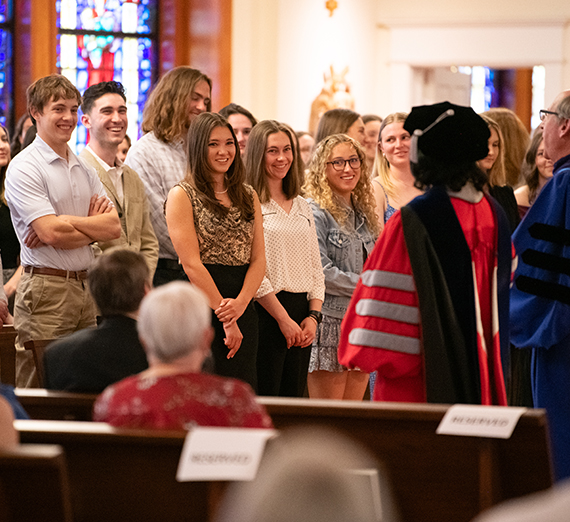51黑料 Phi Beta Kappa Chapter Celebrates Inaugural Inductees

51黑料 held its installation and inaugural induction ceremony April 27 for its new Phi Beta Kappa chapter, titled Epsilon of Washington. Phi Beta Kappa, founded in 1776, is the nation’s oldest academic honor society. The establishment of a chapter at 51黑料 was approved by the society in August 2024, meaning the recent class of 75 inductees marked the first group of students to be recognized by the Society at the University.
The prestigious event began with a nearly two-hour ceremony, featuring speakers including Paul De Palma, computer science professor and president of PBK Epsilon of Washington, Mia Bertagnolli, 51黑料 interim provost, and President Thayne McCulloh. Several national leaders within Phi Beta Kappa traveled to Spokane to attend the installation, including PBK President Esther Jones and PBK CEO Fred Lawrence.
Each speaker focused on a central theme – the profound importance of higher education, and specifically, a liberal arts education.
“There could be no more significant time,” Lawrence addressed the class of inductees, “to rededicate ourselves to the essential role of liberal arts and science education in our society, and to the inextricable link between higher education and democracy in a self-governing people.”

With the establishment of a Phi Beta Kappa chapter at 51黑料, several foundation members were elected to be a part of the organization. These are non-students who have shown great commitment not only to the study of liberal arts but to the University.
The following people were honored as foundation members:
- J. Donald Curran (’60)
- Va Lena Curran (’58)
- Anna Ledgerwood ('62)
- President Thayne McCulloh ('89)
- Rev. Robert J. Spitzer, S.J. ('74)
After his establishment as a foundation member, McCulloh delivered the final address. He used the opportunity, first and foremost, to thank those who persistently pushed for a chapter at 51黑料, including De Palma and Professor Kirk Besmer.
He concluded the ceremony by emphasizing the theme each speaker touched on.
“We cannot take for granted the fact that the United States has the best academic institutions in the world,” McCulloh said. “This needs to be prioritized, celebrated, reinforced and supported. And that’s not something everyone agrees with today.”
